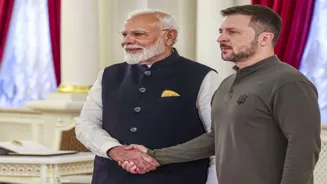According to officials familiar with the matter, Ukraine approached India’s Ministry of External Affairs through diplomatic channels on at least two occasions since last year, after Indian-origin components were discovered in Shahed-136 combat drones used by Russia.
The issue was also brought up with EU sanctions envoy David O’Sullivan during his visit to New Delhi in July. O’Sullivan was in India to brief officials on the EU’s latest sanctions package, which included action against Russian-linked entities, including the Vadinar refinery.
Ukrainian investigations reportedly identified components from two firms, Vishay Intertechnology and Aura Semiconductor, in the drones. A bridge rectifier made by Vishay, assembled in India, was found in the voltage regulation system, while a chip produced by Bengaluru-based Aura Semiconductor was used in the satellite navigation antenna.
Officials clarified that the companies have not violated any Indian laws, as the components are classified as dual-use items, technologies that can serve both civilian and military purposes.
Responding to the development, External Affairs Ministry spokesperson Randhir Jaiswal said India’s export of dual-use items adheres to international non-proliferation norms and is governed by a robust domestic legal framework. “Due diligence is conducted to ensure such exports do not violate any of our laws,” he said.
While the Ukrainian embassy in New Delhi has not issued an official statement, Ukraine’s Defence Intelligence Directorate (HUR) has publicly reported the presence of Indian-origin parts in Shahed drones on its official Facebook and Telegram channels.
Vishay Intertechnology, a US-based electronics manufacturer, did not respond to requests for comment. Meanwhile, Kishore Ganti, co-founder of Aura Semiconductor, said the company fully complies with all national and international export control laws and strongly opposes any unauthorised use of its products.
“We are deeply disturbed by the possibility that any of our components may have reached defence manufacturers through unauthorised third-party channels, in violation of our compliance policies and distribution agreements. We are committed to investigating and addressing any compliance gaps,” Aura said in a statement.














